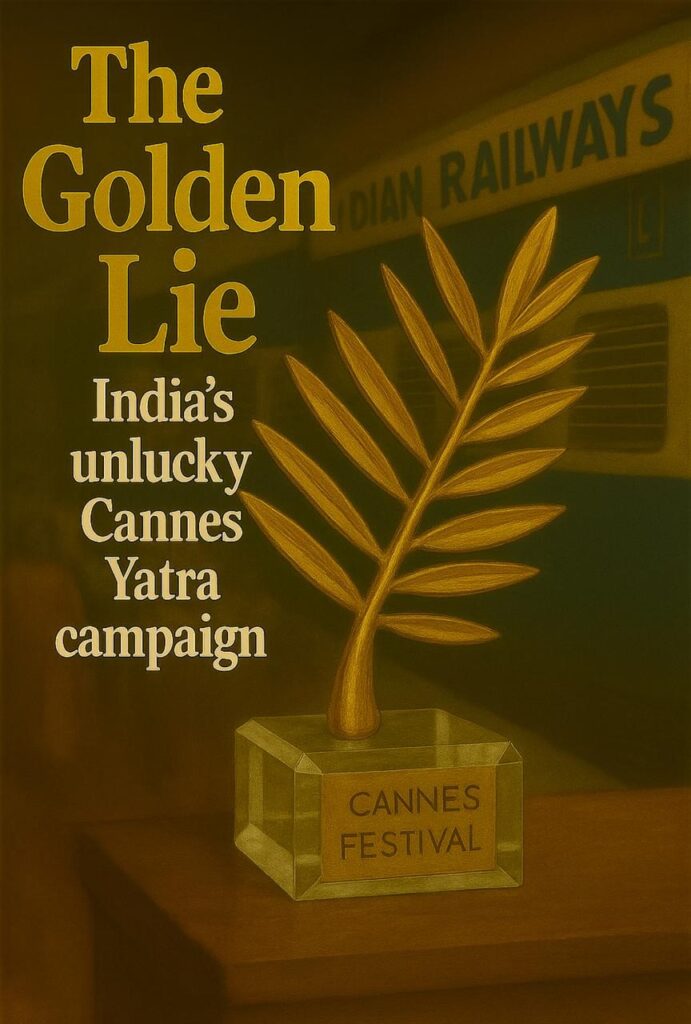How India’s Historic Victory Became Advertising’s Greatest Shame
What happens when an industry built on selling dreams starts selling lies to itself? India’s first Cannes Grand Prix hid a devastating secret, Brazilian agencies weaponized AI for systematic fraud, and advertising’s biggest night became its darkest hour. The shocking truth behind 2025’s awards apocalypse awaits.

After decades of trying, India finally breaks through at Cannes Lions. FCB India’s “Lucky Yatra” campaign makes history, becoming the first Indian entry to win a Grand Prix. The Indian advertising community erupts in celebration. Social media floods with congratulations. Industry veterans wipe away tears of pride. Then reality hits.
The campaign that was supposed to change fortunes? It failed spectacularly in the real world. The “innovative” lottery system designed to boost railway ticket sales? The eight-week long Lucky Yatra Yojana pulled its shutters down owing to no significant increase in ticket sales. India’s moment of glory had become a cautionary tale about everything wrong with modern advertising.
But Lucky Yatra wasn’t alone. The 2025 Cannes Lions festival became a theatre of deception where AI-generated lies, fabricated case studies, and phantom campaigns masqueraded as creative excellence. What emerged wasn’t just a few bad actors gaming the system—it was the unmasking of an entire industry that had lost its moral compass.
When Lions Turn to Wolves
The rot runs deeper than anyone imagined. This year’s Cannes Lions has been marred by controversy, with multiple campaigns withdrawn over manipulated content and questionable claims, raising serious concerns about the role of AI and truthfulness in awards submissions.
Brazilian agency DM9’s systematic fraud reads like a crime thriller. They didn’t just bend the truth—they manufactured it entirely. Using AI to create fake media coverage, simulating campaign results that never existed, and presenting fabricated data to juries, DM9’s “Efficient Way to Pay” campaign swept 21 Lions before the house of cards collapsed. “This breaches the Cannes Lions entry rules on factual representation and undermines the trust placed in the work by our juries and the wider community,” a Cannes Lions spokesperson admitted—a statement that barely scratches the surface of the betrayal.
Industry expert Orunkoyi Adedeji didn’t mince words about the ethical catastrophe: “Every agency has its own guiding principles, and integrity should be non-negotiable.” Yet integrity had become not just negotiable, but entirely absent.
The Indian Paradox: Victory Built on Quicksand
For India’s advertising community, the Lucky Yatra debacle cuts particularly deep. This wasn’t just another failed campaign—it was the country’s first Grand Prix winner, now labeled a “scam ad” for its limited reach among actual commuters and negligible behavioural impact.
The irony is brutal. FCB India created a campaign that looked brilliant in PowerPoint presentations and case study films but crumbled under real-world scrutiny. The promise was simple: turn train tickets into lottery entries to discourage fare evasion. The execution was sophisticated. The results? Virtually non-existent.
Critics haven’t been kind. The campaign has been savaged as emblematic of an industry more interested in winning trophies than solving problems. The controversy has sparked industry soul-searching on integrity, AI and creative truth, with Indian agencies now under a microscope for their approach to international awards.
The Architecture of Deception
The 2025 scandals revealed a sophisticated ecosystem of fraud that makes the old “scam ad” problem look quaint. This wasn’t just agencies creating work for fake clients anymore—this was the weaponization of artificial intelligence to manufacture reality itself.
The warning signs had been flashing for years. Ghost campaigns created solely for awards. Inflated case studies that bore no resemblance to actual results. Client briefs that existed only in agency presentations. But 2025 marked the moment technology enabled deception at industrial scale.
The first ever Cannes Lions Grand Prix withdrawal for AI misuse signals a watershed moment, but is this just the beginning of a much bigger reckoning for marketing in the AI age? The question haunts an industry built on persuasion that has now turned those same skills against itself.
Red Flags in Paradise
The signs were there for anyone willing to look. Campaigns that claimed massive public impact but left no digital footprint. Case studies that relied on unverifiable metrics. Results that seemed too perfect, too clean, too convenient.
Consider the pattern: agencies creating elaborate narratives around campaigns with questionable real-world implementation. Client testimonials that felt scripted. Media coverage that appeared manufactured. Success metrics that couldn’t be independently verified.
The Lucky Yatra campaign embodied all these red flags. Despite claims of high engagement and behavioral change, the campaign was quietly discontinued after eight weeks due to poor performance. Yet it continued to sweep award categories based on a case study that painted a very different picture.
The Cannes Machine: When Commerce Corrupts Creativity
Part of the problem lies in Cannes Lions itself. What began as a celebration of creative excellence has evolved into a massive commercial enterprise where entry fees matter more than entry quality. The festival’s business model creates perverse incentives—more submissions mean more revenue, regardless of their authenticity.
During Cannes Lions 2025, collective concerns around manipulation, synthetic media and the use of AI, resulted in the necessary withdrawal of Lion-winning work. The organization was forced to confront uncomfortable questions about its own complicity in enabling fraud.
The response has been swift but arguably overdue. Cannes organizers are rolling out sweeping integrity reforms: mandatory AI disclosures, dual human-and-AI fact-checking, senior client signoffs, an Integrity Council to vet entries, and even three-year bans for agencies caught gaming the system.
The Global Reckoning
The 2025 controversies have triggered soul-searching across the global advertising community. From São Paulo to Mumbai to New York, agencies are being forced to confront uncomfortable questions about their own practices.
The Brazilian scandal exposed how easily AI can be weaponized to create false narratives. The Indian controversy revealed how agencies prioritize awards over actual effectiveness. Together, they painted a picture of an industry that had lost sight of its fundamental purpose: creating communications that actually work.
Industry observers are divided on whether these reforms will be enough. Some argue that the structural incentives remain unchanged—awards still drive business, recognition still trumps results, and the pressure to impress juries still outweighs the obligation to serve clients honestly.
The Price of Beautiful Lies
What’s particularly tragic about the 2025 scandals is how they’ve tainted genuine creative achievement. Real campaigns with authentic results now face skepticism. Legitimate successes are viewed with suspicion. The entire currency of creative recognition has been devalued.
For India specifically, the Lucky Yatra controversy has cast a shadow over the country’s creative community just as it was gaining international recognition. Years of building credibility have been undermined by one campaign that prioritized awards over authenticity.
The broader industry faces an existential question: Can an awards system built on trust survive systematic betrayal? When case studies become works of fiction and AI enables industrial-scale deception, what does recognition even mean?
Beyond the Glitter: A Fork in the Road
The 2025 Cannes Lions will be remembered as the year the festival’s integrity crisis reached a breaking point. The year India’s first Grand Prix became its greatest embarrassment. The year AI stopped being a creative tool and became a weapon of deception.
But perhaps this crisis was necessary. Perhaps the industry needed to be shocked out of its complacency. Perhaps the only way to restore credibility was to first expose how thoroughly it had been compromised.
The path forward isn’t just about better verification systems or stricter rules. It’s about remembering why creativity matters in the first place—not to win trophies, but to solve problems, move people, and create genuine value in the world.
As the dust settles on advertising’s year of reckoning, one question remains: Will agencies choose the harder path of authentic impact, or will they simply find more sophisticated ways to game the system?
For India’s advertising community, still smarting from the Lucky Yatra debacle, that choice carries particular weight. The next time an Indian campaign wins at Cannes, will it be celebrated as a triumph of creativity or viewed with suspicion as another beautiful lie?
The answer may determine not just the future of awards, but the soul of advertising itself.


